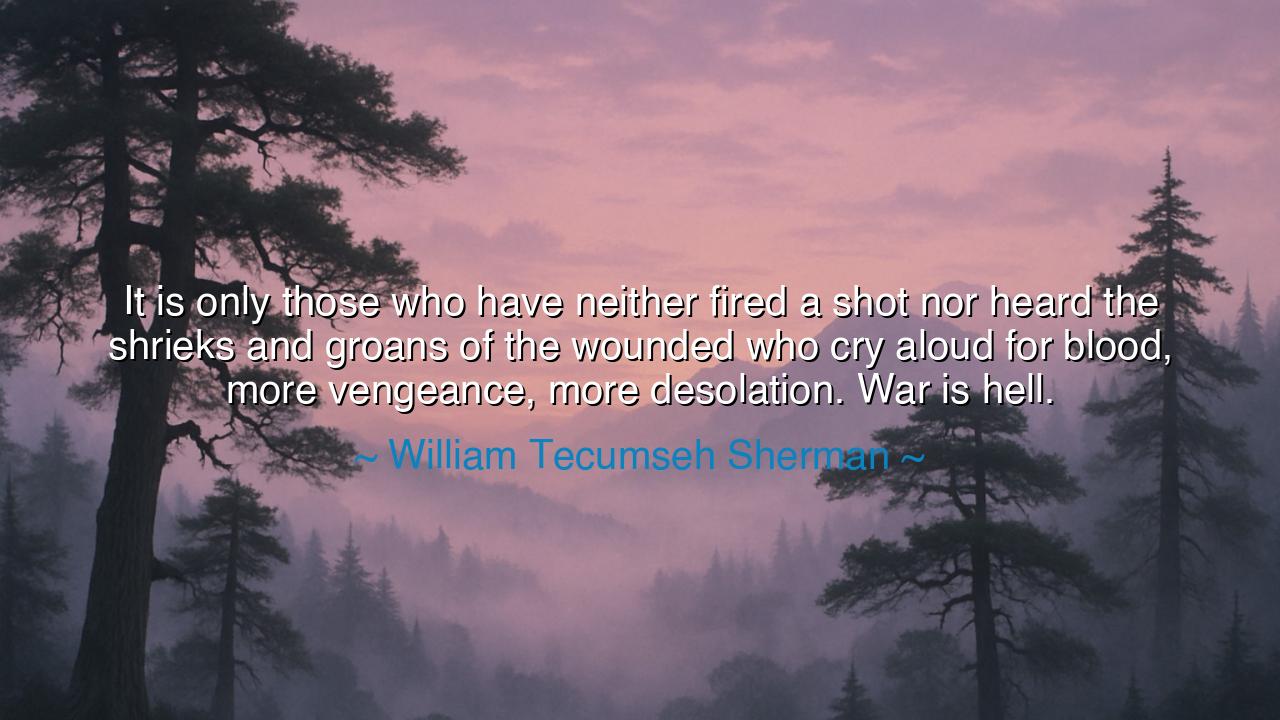
It is only those who have neither fired a shot nor heard the
It is only those who have neither fired a shot nor heard the shrieks and groans of the wounded who cry aloud for blood, more vengeance, more desolation. War is hell.






The Union general William Tecumseh Sherman, who marched through fire and ruin during America’s great fratricidal struggle, spoke with the authority of one who had seen the abyss. He declared: “It is only those who have neither fired a shot nor heard the shrieks and groans of the wounded who cry aloud for blood, more vengeance, more desolation. War is hell. These words are not the rhetoric of politics, nor the boasts of a conqueror, but the cry of a man scorched by the furnace of battle, warning all who would glorify it that they know not what they ask.
Sherman had seen with his own eyes the burning of towns, the hollow eyes of widows, the twisted bodies upon fields of death. He knew that war, though sometimes deemed necessary, is never noble in itself. Those who call for more of it, he said, are almost always those who have never felt its sting. For from the safety of distant chambers or the heat of rhetoric, it is easy to demand vengeance, easy to clamor for blood. But those who have stood knee-deep in mud, amidst the screams of the dying, know its true face—ugly, merciless, unredeemed by any illusion of glory.
The origin of this saying lies in Sherman’s postwar speeches, where he often addressed young men tempted by romantic visions of battle. At one such occasion, he told them with brutal honesty that war is hell, stripping away the glamour that poets and politicians draped over it. His purpose was not to dishonor the sacrifice of soldiers, but to protect future generations from rushing heedlessly into carnage. He spoke as one who understood that the true heroes of war are not those who lust for it, but those who endure it and pray it never returns.
History itself affirms his truth. During the First World War, leaders promised swift victory, and crowds cheered as men marched to the front. Yet within months, the trenches filled with corpses, the earth churned with shells, and entire generations were broken. The ones who had demanded war from the safety of their parliaments did not lie in Flanders fields; it was the young, the ordinary, the voiceless who paid. Sherman's words resound across that chasm of time: those who know war least often cry for it most.
Yet his phrase “war is hell” is more than description; it is warning. Hell is not merely pain—it is the absence of mercy, the triumph of cruelty, the unchaining of all that is worst in mankind. To invoke hell is to say that war consumes not only bodies, but souls. It strips men of innocence, brutalizes nations, and leaves scars that echo for generations. No victory, however necessary, can erase the torment unleashed when humanity chooses war.
For us who hear these words, the lesson is clear: beware of those who demand violence with easy tongues. In our own lives, too, there are those who clamor for harshness, revenge, and conflict—whether in politics, in communities, or in families. Often they are the ones least touched by the consequences, the ones who do not bear the wounds their cries would inflict. Wisdom demands that we resist such voices, that we seek peace before violence, mercy before vengeance, understanding before desolation.
Therefore, let this wisdom endure: honor the sacrifices of those who have fought, but do not glorify the furnace that consumed them. Remember Sherman’s voice across the centuries: war is hell. Let it not be embraced lightly, but only when every path to peace has been tried and found wanting. And in the smaller wars of our own lives, let us strive to extinguish conflict before it burns, lest we create our own little hells and forget that mercy, not vengeance, is the higher way.






HPHoang Phuc
Sherman’s words are sobering, especially considering how often war is glorified or romanticized. When you haven’t experienced it yourself, it’s easy to demand more destruction and vengeance. But as Sherman notes, war is hell—it’s a horrific and traumatic experience that should never be taken lightly. How can we ensure that the voices of those who have endured the horrors of war are heard in discussions about war and peace?
LDNguyen Luu Danh
This quote brings to light the tragic disconnect between the idealized notions of war and its grim reality. People who have never seen the destruction firsthand often fail to understand the devastating impact it has on both soldiers and civilians. What does this say about how societies view war, and how can we educate people about its true costs? Is there a way to make these consequences more real to those who are far from the frontlines?
GQTran pham gia quyen
Sherman’s statement makes me think about the glorification of war in some circles, particularly by those who have never witnessed its brutality. It's easy to call for revenge and destruction when you're far removed from the pain and suffering that war causes. What would happen if more people, especially those in power, truly understood the cost of war? Could it reduce the appetite for conflict in the future?
VANguyen Hoang Van Anh
Sherman’s words are striking because they highlight the disconnect between those who advocate for war and those who have experienced it firsthand. The reality of war, with its physical and emotional toll, is far removed from the idealized version some people have. Why is it that those who have never been directly affected by war often call for more violence? Could it be that the true horrors of war are too distant for many to grasp?